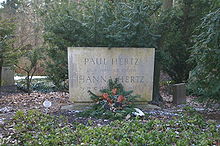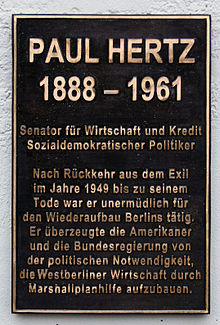Paul Hertz (politician)
Paul Hertz (born June 23, 1888 in Worms , † October 23, 1961 in West Berlin ) was a German politician.
Life
The son of a Jewish businessman, who was born in Worms and grew up in Hamburg and Stettin , found his way into the social democratic labor movement at an early age . From 1920 he represented the USPD and after the return of its right wing to the mother party in 1922 the SPD in the German Reichstag . Since the same year the publicist as well as finance and economics specialist worked as parliamentary secretary of the SPD parliamentary group. From 1919 to 1925 he was also a city councilor for the Berlin district of Charlottenburg . Hertz was already exposed to anti-Semitic attacks by the right-wing camp. Before entering parliament via the Reich electoral list, the sponsor Carlo Mierendorff represented electoral district 11 Merseburg from 1928 .
On March 29, 1934, the Deutsche Reichsanzeiger published the second expatriation list of the German Reich , through which Hertz was expatriated . Before that, at the beginning of May 1933, together with Otto Wels , Erich Ollenhauer and a few other SPD party executive members, he was commissioned to set up a foreign office. Especially since he was already being sought, he immediately followed his fellow board members to Saarbrücken , then to Prague , in order to work there as a paid member of the SPD exile board ( Sopade ) against the Nazi regime . He was the editor of the theoretical exile organ “Zeitschrift für Sozialismus” until it had to cease publication in autumn 1936, and until March 1938 he was editorially responsible for the newspaper Sozialistische Aktion, which was regularly smuggled into the German Reich in very high editions . Hertz not only represented the interests of the socialist affected group on the advisory board of the High Commissioner at the League of Nations for Refugees from Germany, but was also positioned as a reliable intermediary at the sensitive interface between internal German resistance and anti-Nazi work in exile. In his homeland he was meanwhile - like so many others - continued to be racially and politically discriminated, for example by the Nazi propaganda show " The Eternal Jew " presented in the Deutsches Museum in Munich in the winter of 1937/38 .
In the summer of 1937 he went to Spain to gather first-hand information about the civil war , but also to sound out what opportunities there would be for the exiled SPD to become more involved. From 1935 onwards he had moved closer and closer to the positions of the “ New Beginning ” group , and from then on he acted as confidante within the SPD exile executive. Not least because of his advocacy of cooperation and a. With that conspiratorial cadre organization and even for an alliance of convenience with the KPD within the framework of a concentration of socialist forces he had hoped for, it broke with the SPD in 1938. Since then he has also publicly confessed to “starting over”.
At the end of 1939, Paul Hertz was able to escape to the USA together with his wife Hanna and their two children - they had all long been expatriated and dispossessed by the Nazis . There he joined the “American Friends of German Freedom”, who were strongly influenced by his “new beginning” friend Karl Frank and who were renamed “American Association for a Democratic Germany” in mid-1944. With this organization, Hertz joined the Council for a Democratic Germany , initiated by the evangelical theologian and religious socialist Paul Tillich and with a programmatic founding declaration in spring 1944 . Of course, the German Labor Delegation , the official representation of the SPD in exile in the USA, stayed away from this union of left Social Democrats, Socialists and Christians of both denominations, as well as left-wing democrats and a number of well-known writers, artists and scientists, as communists were also involved there. Hertz, now a US citizen, earned his living as a freelance auditor.

It was not until the end of 1949 he returned at the urging of his old companions Ernst Reuter , who is now mayor of West Berlin was, according to Germany back. In 1950, Hertz became head of the main banking and insurance office of the Berlin magistrate as well as a commissioner for financial and economic issues. From 1951 to 1953 he served as Senator for Marshall Plan and Credit. From 1953 to 1955 he was responsible for the Berlin emergency program as an agent for the credit system. And from 1955 until his death, he served his city as Senator for Economics and Finance.
Hertz was buried in the Zehlendorf forest cemetery in Berlin-Nikolassee . The grave is one of the honor graves of the State of Berlin .
In the north of Charlottenburg the " Paul-Hertz-Siedlung " bears his name. The settlement with around 3,200 apartments was built between 1962 and 1965.
literature
- Werner Breunig, Siegfried Heimann , Andreas Herbst : Biographical Handbook of Berlin City Councilors and Members of Parliament 1946–1963 (= series of publications by the Berlin State Archives . Volume 14 ). Landesarchiv Berlin , Berlin 2011, ISBN 978-3-9803303-4-3 , p. 122 (331 pages).
- Martin Schumacher (Hrsg.): MdR The Reichstag members of the Weimar Republic in the time of National Socialism. Political persecution, emigration and expatriation, 1933–1945. A biographical documentation . 3rd, considerably expanded and revised edition. Droste, Düsseldorf 1994, ISBN 3-7700-5183-1 .
Web links
- Literature by and about Paul Hertz in the catalog of the German National Library
- Paul Hertz in the database of members of the Reichstag
- Local political tour with District Mayor Andreas Statzkowsksi on September 29, 2001. District Office Charlottenburg-Wilmersdorf
- Short CV with picture. Ev. Parish of Charlottenburg-Nord
- Paul Hertz Papers - The Paul Hertz Archive at the International Institute for Social History with references to biography and articles by and about Hertz
Individual evidence
- ↑ Michael Hepp (Ed.): The expatriation of German citizens 1933-45 according to the lists published in the Reichsanzeiger, Volume 1: Lists in chronological order . De Gruyter Saur, Munich / New York / London / Paris 1985, ISBN 978-3-11-095062-5 , pp. 4 (reprinted 2010).
| personal data | |
|---|---|
| SURNAME | Hertz, Paul |
| BRIEF DESCRIPTION | German politician (USPD, SPD), MdR |
| DATE OF BIRTH | June 23, 1888 |
| PLACE OF BIRTH | Worms |
| DATE OF DEATH | October 23, 1961 |
| Place of death | Berlin |



